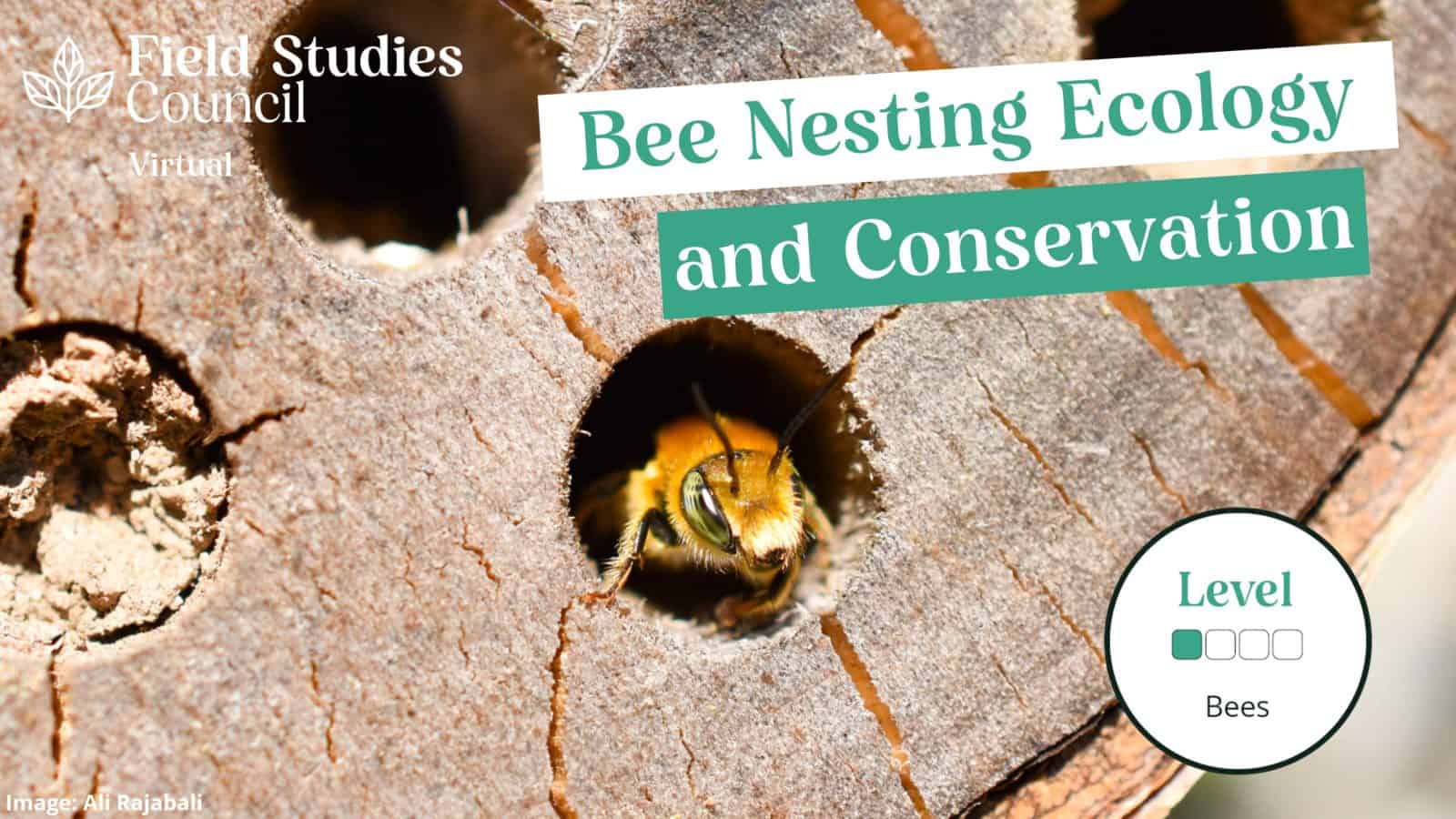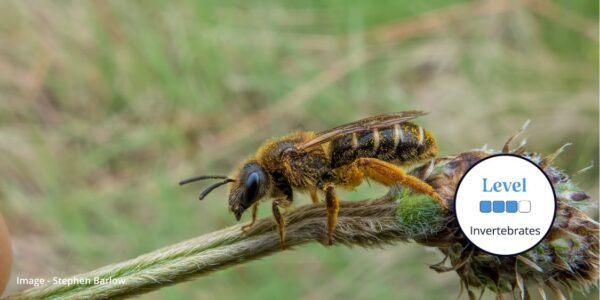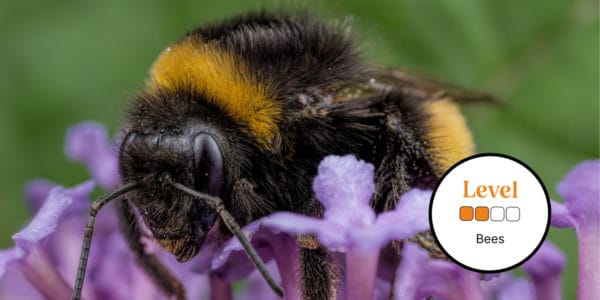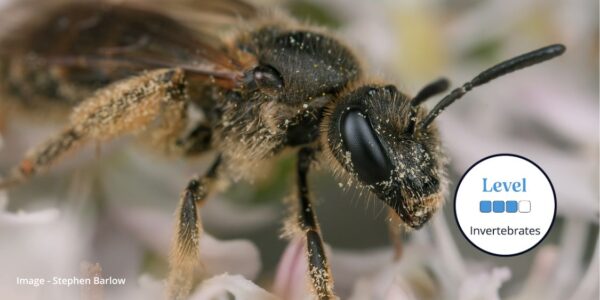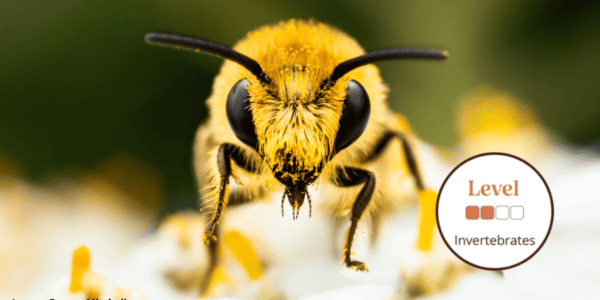Booking is no longer available for this course as it has already commenced.
There are over 20,000 species of bee worldwide, each with its own unique behaviours, life cycles and lifestyles. The nesting ecology of bees varies between different families, with some species living underground in the soil, whilst others excavate their nests in deadwood. Several species prefer to make their nests inside the empty cavities left by other animals and there are even some bees that nest in abandoned snail shells!
Unfortunately, a huge proportion of our bee fauna is in decline due to a combination of environmental and anthropogenic factors. This decline has generated intense interest in the conservation of bees and the ways we can protect populations from extinction. Throughout this course, we will look at the nesting conditions, behaviour and nesting ecology of wild bees as well as discussing the contemporary research and conservation actions being undertaken to restore and rewild our landscape for declining populations in the UK.
Bee nesting ecology and conservation provides an overview of the habitat interactions and current health of our planets most important pollinators.
- 2-week online course for adults, with a weekly time commitment of 3-5 hours per week.
- Access to study content, activities and tutor-graded assignments through the FSC virtual learning platform.
- Access to weekly live virtual classroom sessions at the end of each week with the course tutor through Zoom (recorded for those that are unable to attend the live sessions).
- E-certificate upon course completion.
- Please note that this course is NOT a species identification course and will only go as far as categorising British bees by their life nesting behaviours.
- Please email [email protected] if you have any questions.
What topics are covered in this course?
- BWA205 Bee Nesting Ecology provides an in-depth look into the nesting ecology of bees, which includes the conditions they require to successfully live in an area, the structure and architecture of brood cells and the nesting behaviour of different bee families.
- BWA206 Bee Conservation outlines the issue of bee decline, providing an overview of the main threats to bees both globally and in the United Kingdom. We will also cover the strategies used to conserve bees, including the habitat management practices which support populations and the work which is already underway to reintroduce and protect declining species in the UK.
Course fees
Regular Price: £30 For professionals and residents outside of the UK. Select ‘Attendee (Online)’
Subsidised Price: £10 Subsidised by the FSC BioLinks project for non-professionals eg. volunteers, biological recorders, wildlife gardeners, amateur naturalists and students.Available to UK residents only. Select ‘Attendee Discounted (Online)’
Tutor: Aaron Bhambra
Aaron is an entomologist from the West Midlands who has been studying insects for several years as a pollinator specialist and insect ecologist. His main interests are with ‘urban’ invertebrates and the countless fascinating species which can be found in towns and cities across the UK.
His previous research has focussed on solitary bees, developing habitats for these beneficial and often undervalued pollinators throughout Birmingham, with the Peoples Trust for Endangered Species and the British Entomological and Natural History Society. Aaron started his love for bees with the FSC as a volunteer on their BioLinks courses, before progressing through their learning pathway into a tutoring role. Aaron joined the FSC BioLinks project team as a project officer developing and delivering online bee courses before moving on to undertake a PhD studying pollinators.
Live virtual classroom session dates and times
The webinars will take place every Tuesday for the duration of the course:
- Week 1: Bee Nesting Ecology Webinar - Tue 21 June 2022, 7:00pm - 7:45pm
- Week 2: Bee Conservation Webinar - Wed 29 June 2022, 7:00pm - 7:45pm
The live webinars will be recorded for those that cannot make the session.
Example Timetable
Week 1: Bee Nesting Ecology
- Self-study material: available from 14/06/2022 at 9:00am
- Week 1 live webinar: 21/06/2022 at 7:00pm
Week 2: Bee Conservation
- Self-study material: available from 21/06/2022 at 7:00pm
- Assignments due: 7:00pm pm on 26/06/2022
- Week 2 live webinar: 29/06/2022 at 7:00pm
The final deadline to complete any outstanding assignments and self-study components is 05/07/2022 at 7:00pm.
What's Included
- Access to study content, activities and tutor-graded assignments through the FSC virtual learning platform.
- Access to weekly live virtual classroom sessions at the end of each week with the course tutor through Zoom (recorded for those that are unable to attend the live sessions).
- E-certificate upon course completion.
Bursaries and Subsidies
FSC BioLinks
FSC BioLinks is an exciting project for FSC in the South East and West Midlands, bringing together existing volunteers with skills in biological recording and identification, and new volunteers.
This project provides subsidised training courses, learning opportunities and digital tools focussed on invertebrate identification for anyone involved or interested in biological recording, to build and strengthen the community.
Invertebrates provide us with many useful ecosystem services, like pollination and decomposition, which we cannot survive without but their numbers are declining. Few people know how to identify or record invertebrates meaning there is a lack of data
We are delighted to have been awarded a grant of £1.23 million from the National Lottery Heritage Fund for this project.
Before You Attend
Once you've signed up to the course you'll receive an e-mail with access to the virtual learning platform (Moodle) a week before the first webinar.
Log on as soon as you can to familiarise yourself with the platform and course materials, and be sure to complete the first activities before the first webinar.
Webinars are delivered through Zoom, so you don't need to download any additional software to attend - just click the link just before the meeting is due to start and it will open in your web browser.
Sorry this course has ended

